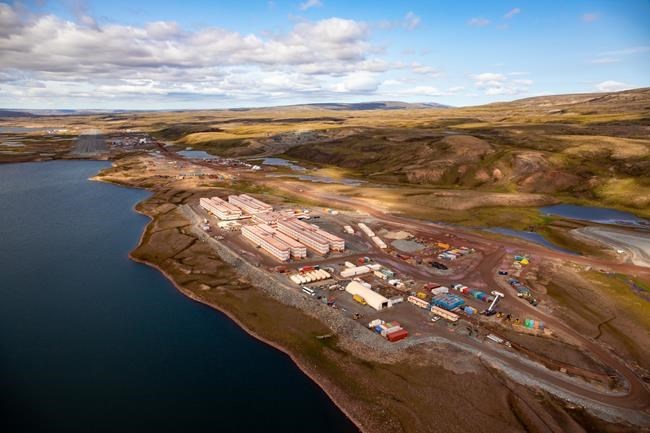IQALUIT, Nunavut — Naymen Inuarak stands on a road that sees trucks carry iron ore from a mine on the north side of Nunavut's Baffin Island before sending it out to sea.
On Thursday night, after travelling about 150 kilometres by snowmobile over two days, Inuarak and other hunters from Pond Inlet and Arctic Bay blocked that road and an air strip used to fly workers in and out of the Mary River mine site.
The mine, owned by Baffinland Iron Mines Corp., wants to double its output to 12 million tonnes from six million tonnes and build a 110-kilometre railway to take the ore out to the coast. The railway would be the only one in Nunavut and the most northern one in Canada.
Inuarak, his group and other community members are against the proposed expansion and worry about its effects on wildlife and the environment.
Inuarak said he also believes community voices aren't being heard by the mining company and their regional Inuit organization.
"We've been left out and ignored. We're taking our own steps now," Inuarak said in an interview over satellite phone.
Seven hunters have set up tents on the road and are also taking shelter in a hunter's nearby cabin, he said.
Others will be joining them, he added. They do not have a timeline for how long they plan to block the road and the airstrip.
"This is just the beginning for us."
Baffinland said in a news release Friday that it has been in communication with the hunters and is aware of the blockades.
"Baffinland respects the right to peacefully protest and continues to work with the hunting party to maintain the safety of everyone at Mary River," it said.
Public hearings before the Nunavut Impact Review Board are underway in Pond Inlet and Iqaluit this week on the mine's proposed expansion. The hearings are to continue in March and, once complete, the review board will send a report to the federal minister of northern affairs recommending whether it should go ahead.
Inuarak said the mine has already affected wildlife normally harvested and relied on for food by Inuit in the area.
Among the communities' concerns are that caribou will not be able to cross the proposed railway and increased ship traffic will drive away marine mammals.
The mine's shipping port, in Milne Inlet, opens onto narwhal habitat and lies within Tallurutiup Imanga, a national marine conservation area. The proposed expansion would see 176 ships travel in and out of Milne Inlet each year.
"There's hardly any marine mammals now in the Pond Inlet area. There used to be so many," Inuarak said.
"If they start doing 12 million tonnes a year, our marine mammals will be completely extinguished in our area."
Baffinland has said their expansion plans will include mitigation measures to protect wildlife, such as caribou crossings on the railway and reduced ship speeds to minimize disturbances to marine life.
The company has also signed a benefit agreement worth $1 billion over the life of the mine with the Qikitani Inuit Association, the regional Inuit organization that represents the affected communities.
The agreement will only take effect if the expansion is approved.
This report by The Canadian Press was first published Feb. 5, 2021.
Emma Tranter, The Canadian Press




